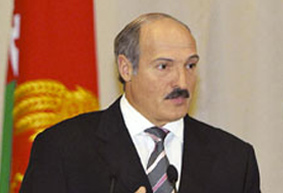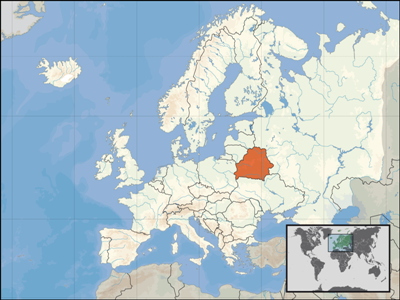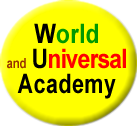Alexander Lukashenko (Belarusian: Алякса́ндар Рыго́равіч Лукашэ́нка, Alyaksandar Ryhoravich Lukashenka; Russian: Алекса́ндр Григо́рьевич Лукаше́нко, Aleksandr Grigoryevich Lukashenko) (b. August 30, 1954) has been the President of Belarus since 1994.
Early career (to 1994)
Lukashenko was born in 1954 in the village of Kopys in the Vitebsk voblast of what was then the Byelorussian Soviet Socialist Repubic. He graduated from the Mogilev Pedagogical Institute in 1975, leading a Komsomol chapter in Mogilev from 1977-1978. In 1975-1977 and in 1980-1982 Lukashenko served in the frontier troops (Border Guards of KGB) and in the Soviet Army. After leaving the armed forces, he became the deputy chairman of a collective farm in 1982 and in 1985, after graduating from the Belarussian Agricultural Academy, he was promoted to the post of director of the Gorodets state farm and construction materials plant in the Shklov district.
In 1990, Lukashenko was elected as a Deputy in the Supreme Soviet of the Republic of Belarus, his first step as a politician. He founded a faction called Communists for Democracy, which advocated a democratic Soviet Union run on communist principles. He claims to have been the only deputy of the Belarusian parliament who voted against ratification of the December 1991 agreement that dissolved the Soviet Union and set up the Commonwealth of Independent States in its place. In the aftermath of the dissolution of the USSR, Lukashenko briefly returned to management of a state farm.
Having acquired a reputation as an eloquent opponent of corruption, Lukashenko was elected in 1993 to serve as the chairman of the anti-corruption committee of the Belarusian parliament. Although he maintained a close association with leftist Communist factions, he fell out of favour with much of the Party of Communists of Belarus for his attacks on the corruption and privileges of the Communist nomenklatura.
In late 1993, he accused 70 senior government officials of corruption including stealing state funds for personal purposes. Stanislav Shushkevich, the speaker of the parliament, was accused by Lukashenko of failing to tackle government corruption. Lukashenko's accusations led to a vote of confidence, which Shushkevich lost. Some believe that the vague nature of the charges indicates they were merely a pretext for removing Shushkevich, who had become increasingly unpopular among the conservative parliamentary majority.
A new Belarusian constitution enacted in early 1994 paved the way for the first democratic presidential elections, held in July that year. Six candidates stood, including Lukashenko, who campaigned as an independent on a populist platform of "defeat[ing] the mafia." Shushkevich and Vyacheslav Kebich also ran, with the latter regarded as the clear favourite. In the event, Lukashenko won 45% of the vote against 15% for Kebich and only 10% for Shushkevich. A second round was held on July 10 in which Lukashenko won over 80% of the vote.
First term (1994–2001)
Lukashenko's victory came as a surprise to many in Belarus and abroad, given his youth and lack of experience. His manifesto during the campaign included establishing a clean government; removing corrupt officials from office and bringing to trial those who had abused their positions; maintaining pay and working conditions in what was still an almost entirely state-run economy; and moving towards greater integration between Belarus and Russia. There were wide-spread rumours in Belarus that he was supported by Russian secret services.
Although he won substantial popular support due to his proclaimed opposition to privatization and market reformers, much of his electoral platform was focused on the corruption of the Belarusian government. He claimed during the campaign that he was facing a constant threat of assassination and that he had even been shot at.
Lukashenko's platform was strongly at odds with the pro-reform policies backed by the leaders of Belarus' neighbours, which had undertaken radical reform following the fall of Communism. Very little privatization, however, had taken place in Belarus. Only 2% of the economy had been privatized by the time of Lukashenko's election. The end of the Soviet command economy, on which Belarus was very heavily dependent, led to a 50% drop in production between 1991 and 1994 and a corresponding fall in living standards. At the time of the 1994 election Belarus faced an economic crisis: the question was what to do about it.
Lukashenko acted quickly to stabilize the economy: one of his first acts was doubling the minimum wage through increased supply of currency. He also reintroduced state control of prices and reversed the few economic reforms that had taken place. But he faced great problems in trying to revive a command economy in a country of 10.4 million surrounded by emerging capitalist economies.
During his first two years in power, Lukashenko faced an increasingly vocal domestic opposition. In 1995 the World Bank and the International Monetary Fund suspended lending money to Belarus, citing the government's lack of economic reform. The slow pace of market reforms in Belarus drew strong criticism from the opposition, to which Lukashenko reacted angrily.
In the summer of 1996, 70 deputies of the 199-member Belarusian parliament signed a petition to impeach Lukashenko on charges of violating the Constitution. Lukashenko invited top Russian officials as "mediators" such as former Russian premier Viktor Chernomyrdin and managed to escape immediate impeachment with their support. Shortly after that a referendum was held on November 24, 1996, where 4 questions offered by Lukashenko and 3 questions offered by group of Parliament members were raised.
On November 25, it was announced that 70.5% of voters, on an 84% turnout, had approved the new version of the Constitution which gave more power to the President. However, the United States and the European Union refused to accept the legitimacy of the referendum.
Lukashenko immediately used his new powers to close down the Belarusian parliament. Armed police took over the parliament building and locked out 89 deputies regarded by the government as "disloyal". A new parliament, made up of 110 hand-picked supporters of Lukashenko, was established in a building next door[citation needed]. His actions were widely condemned internationally by governments and human rights groups.
The Belarusian Prime Minister and two other ministers resigned in protest, as did seven of the eleven members of the Constitutional Court; they were replaced by Lukashenko supporters who promptly rejected the impeachment petition.
At the start of 1998, the Russian central bank suspended trading in the Belarusian ruble, which led to a collapse in the value of the currency. Lukashenko responded by taking control of the Belarus central bank, ordering the exchange rate to be set back to earlier levels, freezing bank accounts and curtailing the activities of commercial banks. This led to a run on Belarusian banks and a spate of panic buying.
He blamed foreign governments for conspiring against him, and in April 1998 he expelled ambassadors from the United States, Britain, France, Germany, Greece, Italy and Japan from their residential complex near Minsk, offering them another building. This caused an international outcry, as diplomatic residences are supposed to be strictly off limits under the terms of the Vienna Convention. The affronted countries all withdrew their ambassadors, as did, temporarily, Russia.
Although the ambassadors eventually returned after the controversy died down, Lukashenko stepped up his rhetorical attacks against the West and took to portraying his domestic opponents as stooges of hostile foreign powers. He claimed that Western governments were trying to undermine Belarus at all levels, including the economy (ejecting an International Monetary Fund delegation and labelling them "swindlers") and even sporting (claiming that Western countries were conspiring to defraud Belarus of medals in the 1998 Winter Olympics in Nagano, Japan).
Lukashenko began to take a more active stance of supporting countries struggling against U.S. hegemony. The outbreak of the Kosovo War in 1999 led to Lukashenko proposing a "Slavic Union" of Russia, Belarus, Ukraine and Yugoslavia, an idea which received only lukewarm support and was quietly dropped. Following the Iraq war of 2003, the United States announced that several high-ranking Iraqi officials had been issued Belarusian passports.
These policies led Western governments to take a tougher position against Lukashenko. The United States was particularly angered by Belarus's arms trade with the so-called "Axis of Evil" countries and American political leaders increasingly began to refer to Belarus as "Europe's last dictatorship", comparing Lukashenko with Yugoslavia ousted leader Slobodan Milošević. The European Union was concerned for the security of its gas supplies from Russia, which are piped through Belarus, and took an active interest in the country's affairs when the accession of Poland, Latvia and Lithuania gave the EU a lengthy border with Belarus. |
Aliaksandr Ryhoravitch Loukachenka (Alexandre Loukachenko) (en biélorusse : Аляксaндр Рыгoравіч Лукашэнка, en russe : Алексaндр Григoрьевич Лукашeнко Aleksandr Grigorievitch Loukachenko) (né le 30 août 1954) est l'actuel président de Biélorussie.
Élu le 20 juillet 1994 et réélu en 2001 et 2006, sa présidence est controversée en raison de l'opacité du régime et de ses déclarations pour le moins violentes. Ses détracteurs le qualifient d'autoritaire et dictatorial alors que ses partisans estiment que sa politique a permis d'éviter au pays les pires effets de l'instauration du capitalisme de l'ère post-soviétique.
En 2005 un rapport de la Banque mondiale juge que « l'économie biélorusse est réelle et robuste », et que les bénéfices sont largement redistribués à la population. Sous la présidence de Loukachenka le chômage est officiellement inférieur à 2%, la pauvreté a diminué et le revenu moyen par habitant est plus important que dans beaucoup d'autres anciens pays de l'Union soviétique, y compris l'Ukraine. Cependant la croissance économique biélorusse repose sur des tarifs préférentiels que lui concède la Russie notamment en matière énergétique. C'est ce qui lui vaut sa popularité auprès de la population.
Sur la scène internationale la Biélorussie de Loukachenka est isolée à l'exception de ses rapports entretenus avec la Russie. Loukachenka est couramment qualifié de « dernier dictateur d'Europe » en référence à la restriction continuelle des libertés publiques dans son pays. Il est aujourd'hui interdit de séjour en Europe et aux États-Unis. La Biélorussie n'étant pas considérée comme une démocratie par une majorité des médias et politiciens occidentaux , elle n'a pu rejoindre le Conseil de l'Europe.
Débuts politiques
Loukachenka est né dans le village de Kopys de ce qui était alors la République soviétique et socialiste Biélorusse. Il est diplomé de l'institut d'enseignement Mahiliow en 1975. De 1975 à 1977 et de 1980 à 1982, Loukachenka sert dans l'armée comme garde frontière. En 1982, après avoir quitté l'armée il devient le vice président d'une ferme collective et en 1985 il est promu au poste de directeur de l'usine de matériaux de construction de fermes d'État de Haradziets dans le rayon de Chklow. En outre en 1985 il obtient un diplôme de l'académie agricole de Biélorussie.
En 1990, Loukachenka est élu comme député au Conseil suprême de la République biélorusse, son premier pas en politique. Il fonde un groupe politique nommé « des communistes pour la démocratie », qui défend une Union soviétique démocratique basée sur des principes communistes. Il prétend avoir été le seul député à voter contre la ratification de l'accord de décembre 1991 concernant la dissolution de l'Union soviétique et la création de la CEI. Au lendemain de la dissolution de l'URSS, Loukachenka retourne brièvement gérer une ferme d'État.
Ayant acquis une réputation d'éloquent opposant à la corruption, Loukachenka est élu en 1993 pour servir comme président au comité anti-corruption au parlement biélorusse. Bien qu'il maintienne une étroite association avec les partis communistes, il tombe en disgrace à la suite de ses critiques répétées contre la corruption et les privilèges de la nomenklatura. À la fin de l'année 1993, il accuse 70 hauts fonctionnaires, et notamment Stanislaw Chouchkievitch, le président du Parlement, de corruption incluant détournement de fonds à des buts personnels. Les accusations de Loukachenka conduiront à la tenu d'un vote de confiance que Stanislaw Chouchkievitch perdra. Par la suite les accusations de Loukachenka se révèleront infondées.
Premier mandat présidentiel
Une nouvelle Constitution est édictée au début de l'année 1994 menant ainsi à de véritables élections présidentielles démocratiques tenues début juillet de la même année. Six candidats sont en lice, dont Loukachenka, Chouchkievitch et Vyatchaslaw Kiebitch. Ce dernier est le grand favori mais, à la surprise de tous, Loukachenka dont la campagne populiste a pour thème « vaincre la mafia » remporte le premier tour avec 45% des voix. Le 10 juillet au second tour Loukachenka gagne avec plus de 80% des voix.
Loukachenka agit rapidement pour « stabiliser l'économie ». L'une de ses premières mesures est de doubler le salaire minimum. Il introduit un contrôle des prix et abroge les quelques réformes économiques qui avaient été menées. Il fait face à l'énorme problème de ranimer une économie communiste dans un pays de 10,4 millions d'habitants entourés par des pays capitalistes émergents. La Biélorussie est complètement dépendante du gaz et de l'électricité importée de Russie payés à prix préférentiels. L'absence de moyens financiers pour payer les importations russes fit alors de la coopération économique avec la Russie une nécessité pour la Biélorussie.
Durant les deux premières années de son mandat présidentiel, Loukachenka fait face à une opposition virulente. En 1995 la Banque mondiale et le FMI suspendent les prêts financiers à la Biélorussie à cause du manque de réformes économiques. |




